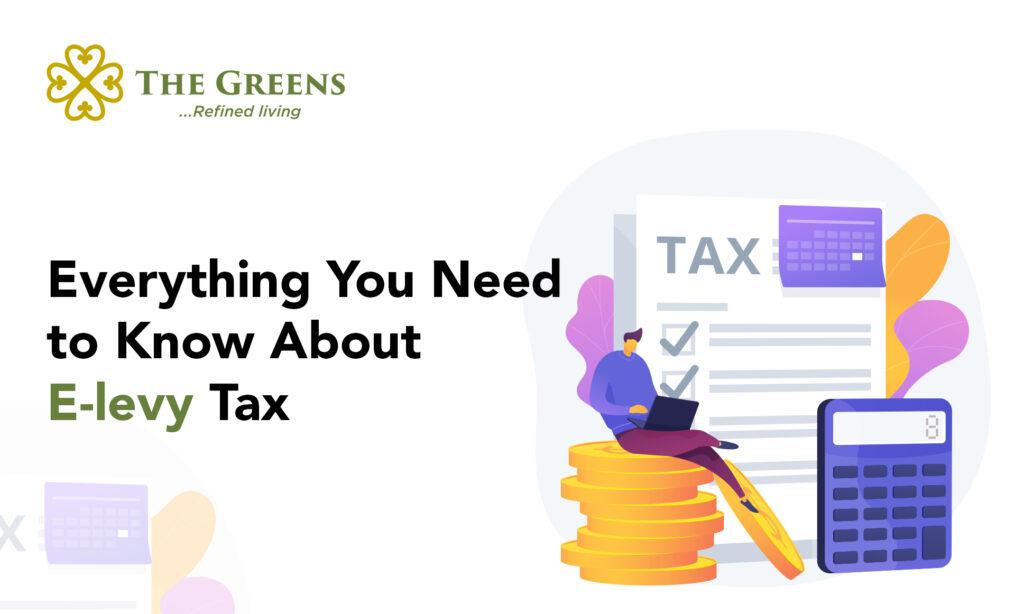The Impact of Ghana’s E-Levy Tax on Real Estate Transactions
Introduction
The e-levy tax, introduced in Ghana in May 2022, is a new tax that imposes a 1.5% levy on electronic transfers, including real estate transactions. This tax affects property deals conducted using electronic payment methods, such as mobile money or bank transfers, where a 1.5% tax is applied to the transaction’s value.
The long-term impact of the e-levy tax on the real estate market is still uncertain. However, it is important for buyers, sellers, and real estate agents to understand the tax and its potential implications for their real estate dealings.
Impact on Various Real Estate Transactions
- Purchase of a New Home: When acquiring a new home in Ghana through electronic payments, the e-levy tax is applied to the total purchase price, covering land, building, and related costs.
- Sale of an Inherited Property: Selling an inherited property using electronic payments incurs the e-levy tax on the sale proceeds, minus associated costs.
- Rental of a Commercial Space: Renting a commercial space in Ghana via electronic payments results in the e-levy tax being applied to the monthly rent amount.
Potential Impact on the Real Estate Market
- Increased costs: The e-levy tax could lead to increased costs for buyers, sellers, and real estate agents.
- Reduced demand: The added cost of the e-levy tax could deter some people from buying or selling real estate.
- Shift to cash transactions: Some people may choose to use cash transactions to avoid paying the e-levy tax.
- Foreign investment: The e-levy tax could deter foreign investors from investing in Ghana’s real estate market.
Government’s Objectives and Revenue Utilization
The government aims to achieve two primary objectives through the e-levy tax:
- Generate revenue for infrastructure development, social programs, and job creation.
- Promote financial inclusion by encouraging the adoption of electronic payments.
Challenges in Implementing and Enforcing the Tax
The implementation and enforcement of the e-levy tax present several challenges, including the risk of evasion and fraud in electronic transactions and potential technical difficulties associated with a new tax system.
Benefits and Challenges for the Real Estate Sector
The e-levy tax brings potential benefits and challenges for the real estate sector:
Potential Benefits:
- Enhanced transparency and efficiency in the real estate market.
- Reduced reliance on cash transactions.
- Increased government revenue for infrastructure development.
- Promotion of electronic payments in the real estate sector.
Potential Challenges:
- Increased costs in real estate transactions.
- Reduced demand for real estate.
- A potential shift towards cash transactions.
- Decline in foreign investment in Ghana’s real estate sector.
Mitigating Challenges
The government and industry stakeholders can take steps to mitigate the potential challenges of the e-levy tax on the real estate market, such as:
- Providing tax breaks or other assistance to buyers and sellers who use electronic payments.
- Exempting certain types of real estate transactions from the e-levy tax.
- Educating consumers about the e-levy tax and how it works.
- Working with banks and other financial institutions to ensure that electronic payments for real estate transactions are smooth and efficient.
Conclusion
Understanding the implications of Ghana’s e-levy tax on real estate transactions is crucial for individuals and businesses, especially in the real estate sector. Buyers, sellers, and real estate agents should stay informed about this new tax and its potential impact on their real estate dealings. Navigating the impact of the e-levy tax is essential to make informed decisions and adapt to the changing landscape of real estate transactions in Ghana.


